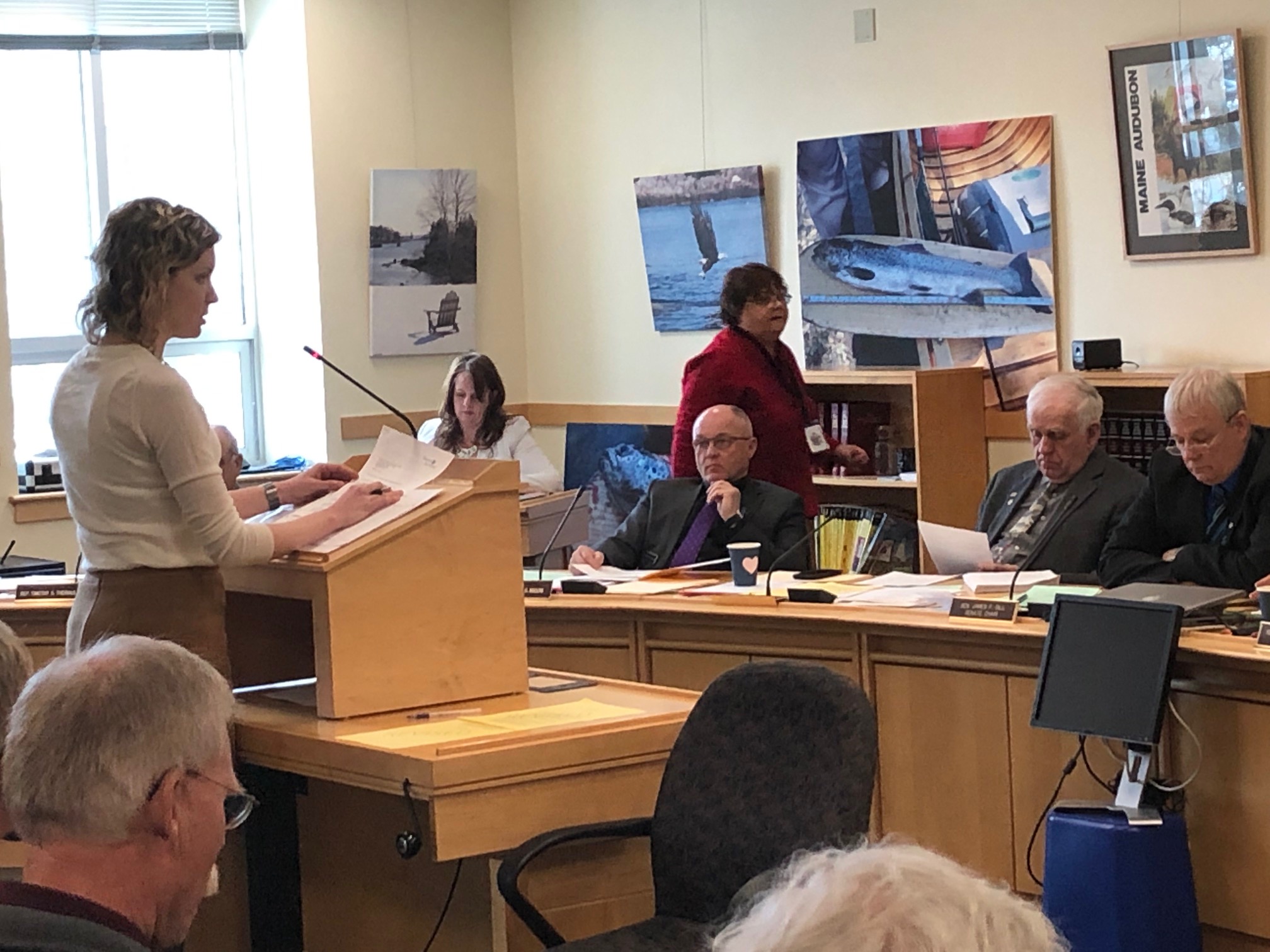
Maine Audubon staff were hard at work in the state legislature today working to protect Maine wildlife. In addition to testifying on a bill that would clarify Maine’s state bird, a bill that would increase funding for invasive aquatic species prevention and protection, and a bill that seeks to lessen the number of soft plastic lures that make it into fish bellies and onto lake bottoms, we testified in support of one of our highest priority bills this session: LD 713, An Act to Strengthen Maine’s Endangered Species Laws.
The sponsor, Representative Catherine Nadeau of Winslow, presented an amendment that would improve this already-strong bill by: (1) empowering the Department of Inland Fisheries and Wildlife to better enforce the law; (2) putting the public on notice to the seriousness with which Maine takes protecting threatened and endangered species; and (3) clarifying that the law intends to protect against actions that disrupt species’ normal behavioral pattern. You can read our full testimony below.

We’re hopeful for the prospects of this bill. Only one entity spoke against it, and we are confident their concerns are addressed in existing law. Next, the bill will go to work session, during which the Committee on Inland Fisheries and Wildlife will gather more information about the bill as needed, and will debate the its merits.
Stay tuned for updates on this bill and others — and thank you as always for your support of Maine Audubon’s advocacy work.
RE: LD 713, An Act to Strengthen Maine’s Endangered Species Laws
Public Hearing in front of the Committee on Inland Fisheries and Wildlife
February 27, 2019
Dear Senator Dill, Representative Nadeau, and Members of the Committee:
Thank you for the opportunity to submit testimony in support of LD 713, An Act to Strengthen Maine’s Endangered Species Laws, on behalf of Maine Audubon and our 30,000 members and supporters.
Maine Audubon has been a part of the conversations that led to Representative Nadeau’s proposed amendments to LD 713. Our testimony is in response to those amendments.
In 1973, President Nixon signed the Endangered Species Act (ESA), establishing landmark legislation to protect the most vulnerable wildlife populations across the country. Two years later, the state of Maine passed its own Endangered Species Act to provide complementary protection and ensure the conservation of species in danger of going extinct within the state.
The Maine Endangered Species Act (MESA) has been instrumental in ensuring that populations of listed species remain viable. Currently, 26 inland fish and wildlife species are listed as endangered under MESA, and another 25 are listed as threatened. Endangered and threatened marine species are protected under a separate act, the Maine Marine Endangered Species Act.
MESA provides protections for a wide variety of imperiled species, from mammals, birds, and fish to reptiles, amphibians, and invertebrates. Some species, like the Golden Eagle and Harlequin Duck, are found in other states but are rare in Maine, while others, like the Katahdin Arctic butterfly, live nowhere else in the world.
In addition to providing state-specific protections, the benefit of MESA is that it can pick up slack when federal laws are under threat. MESA works in concert with both the federal Endangered Species Act and the federal Migratory Bird Treaty Act – but both of those important laws are currently at risk. The Department of the Interior (DOI) said it would no longer enforce critical aspects of the Migratory Bird Treaty Act, and the Trump administration has proposed rules that would significantly weaken the federal ESA.
It’s more important than ever that MESA is strong and effective to ensure the protection of Maine’s most vulnerable wildlife. This could be especially meaningful for species like the piping plover – a species Maine Audubon monitors and helps every breeding season – which is federally threatened and state endangered. Currently the U.S. Fish and Wildlife Service usually takes the lead on investigating crimes related to harassing or killing plovers, but if the federal law is weakened or undermined, we will be depending more on our state laws to play a lead role protecting species.
LD 713 as proposed to be amended would empower the Department of Inland Fisheries and Wildlife (DIFW) to better enforce the law, would put the public on notice to the seriousness with which Maine takes protecting threatened and endangered species, and would clarify that the law intends to protect against actions that disrupt species’ normal behavioral patterns, such as development activity in proximity to endangered and threatened species habitat.
Maine Audubon supports Representative Nadeau’s proposed amendments to LD 713 for a number of reasons:
The bill would instate penalties that would meaningfully deter violators. Animal collectors, those who seek to have a “specimen” of many species, are rapacious and will go to great lengths to expand their collection, including taking endangered and threatened species. LD 713 as amended would create a mandatory minimum fine at a level that would meaningfully deter intentional violators.
The bill as amended is based on natural resource law precedent. We are aware of the concerns that the bill, as printed, may not have achieved its intended effect. Specifically, that it is unrealistic to expect a District Attorney (DA) to prosecute a MESA violation as a felony and that the DA might require lesser/no jail time and/or a lesser fine. We applaud stakeholders for looking for examples within existing Maine natural resource law to achieve the desired effect. The amended version of the bill mirrors penalty provisions for big game and fish stocking law violations.
The bill as amended would prompt timely conversations between the Department and developers. MDIFW has historically worked well with developers to resolve conflicts with endangered and threatened species. Their goal is to assist developers and others in avoiding violations of MESA, with on-site project review to determine if a “take” is likely and if so, with assistance exploring alternative project layout, buffering, etc. Unfortunately, as worded, MESA does not readily put developers and others on notice about the importance of having a conversation with the Department. The amended version of the bill clarifies prohibited acts under MESA, prompting conversations before it’s too late. Some endangered and threatened species in Maine are so rare that a single poorly designed development can jeopardize the species’ existence in Maine.
Thank you for the opportunity to address the Committee on this vitally important bill. Maine Audubon encourage you to support this important and timely bill. We welcome your questions today and as you move into work session.
Sincerely,
Eliza Donoghue, Esq.
Senior Policy & Advocacy Specialist
